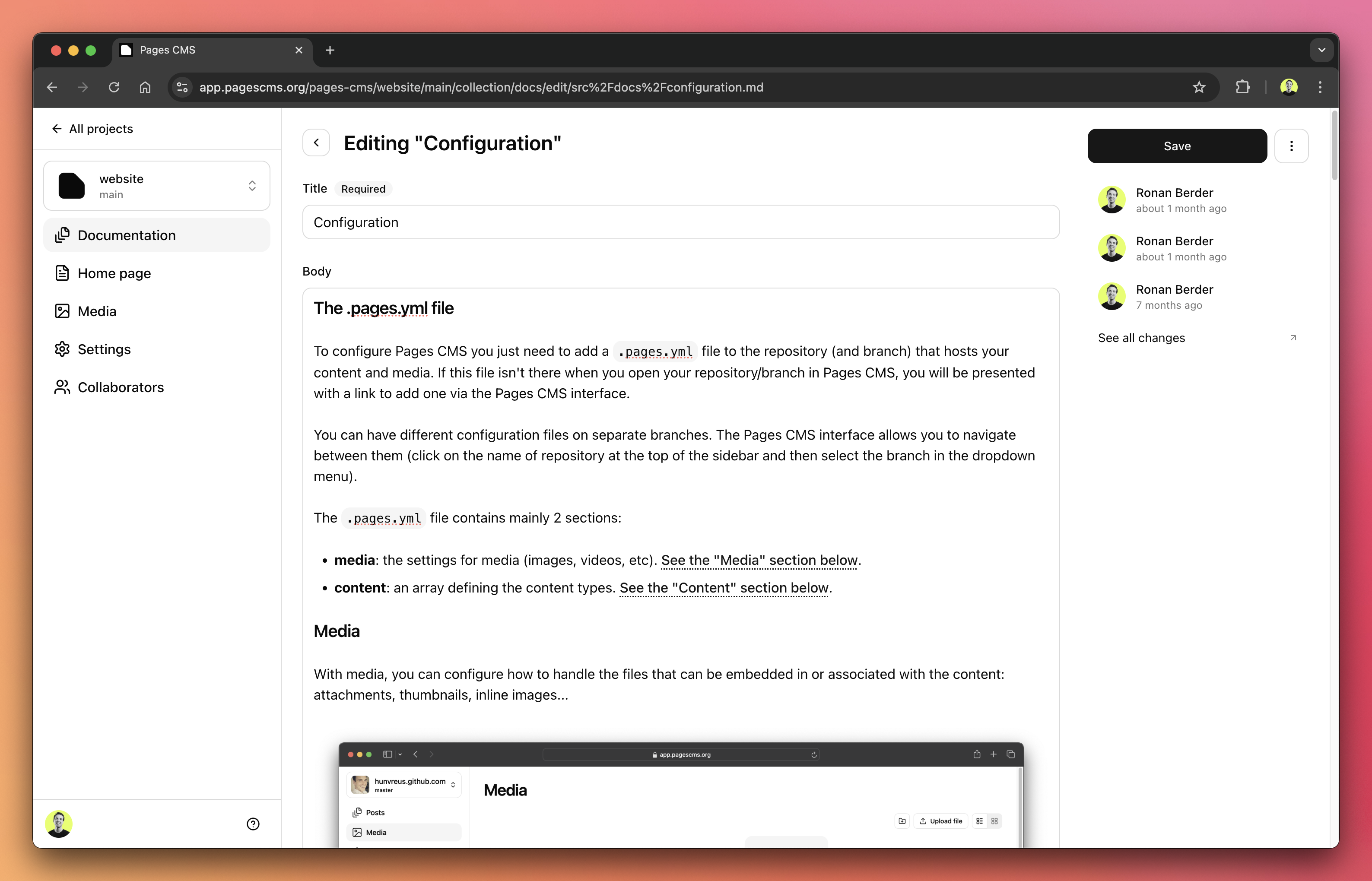Pages CMS is an Open Source Content Management System for GitHub. It is particularly well suited for static site generators (e.g. Jekyll, Next.js, VuePress, Hugo).
It offers a user-friendly interface to edit the content of your website or app directly on GitHub.

Go to pagescms.org/docs.
The easiest way to get started is to use the online version of Pages CMS. You'll be able to log in with your GitHub account and get the latest version of Pages CMS.
This online version is identical to what's in this repo, but you can also install your own version locally or deploy it (for free) on Vercel following the steps below.
Whether you're installing Pages CMS locally or deploying it online, you will need a GitHub App.
You can either create it under your personal account (https://github.com/settings/apps) or under one of your organizations (https://github.com/organizations//settings/apps).
You will need to fill in the following information:
- GitHub App name: use "Pages CMS" or whatever you think is appropriate (e.g. "Pages CMS (dev)").
- Homepage URL: whatever you want, https://pagescms.org will do.
- Identifying and authorizing users:
- Callback URL: the URL for
/api/auth/github:http://localhost:3000/api/auth/githubfor development,- something like
https://my-vercel-url.vercel.app/api/auth/github(or whatever custom domain you're using) if you're deploying on Vercel.
- Expire user authorization tokens: no.
- Request user authorization (OAuth) during installation: yes.
- Enable Device Flow: no.
- Callback URL: the URL for
- Post installation:
- Setup URL (optional): leave empty.
- Redirect on update: no.
- Webhook:
- Active: yes.
- Webhook URL: the (public) URL for
/api/webhook/github:- for development, you'll need to use something like ngrok. You'll end up with something like
https://your-unique-subdomain.ngrok-free.app/api/webhook/github. - something like
https://my-vercel-url.vercel.app/api/webhook/github(or whatever custom domain you're using) if you're deploying on Vercel.
- for development, you'll need to use something like ngrok. You'll end up with something like
- Secret: generate a random string (for example with
openssl rand -base64 32on MacOS/Linux)
- Permissions:
- Repository permissions:
- Administration: Read & Write
- Contents: Read & Write
- Metadata: Read only
- Organization permissions: nothing.
- Account permissions: nothing.
- Repository permissions:
- Subscribe to events:
- Installation target
- Repository (you'll probably need to add this after creating the GitHub App)
- Where can this GitHub App be installed?: you'll want to select "Any account" unless you intend to only use Pages CMS on the account this GitHub App is created under.
| Variable | Comments |
|---|---|
CRYPTO_KEY |
Used to encrypt/decrypt GitHub tokens in the database. On MacOS/Linux*, you can use openssl rand -base64 32. |
GITHUB_APP_ID |
GitHub App ID from your GitHub App details page. |
GITHUB_APP_NAME |
Machine name for your GitHub App (e.g. pages-cms), should be the slug the URL of your GitHub App details page. |
GITHUB_APP_PRIVATE_KEY |
PEM file you can download upong creation of the GitHub App. |
GITHUB_APP_WEBHOOK_SECRET |
The secret you picked for your webhook. This is used to ensure the request is coming from GitHub. |
GITHUB_APP_CLIENT_ID |
GitHub App Client ID from your GitHub App details page. |
GITHUB_APP_CLIENT_SECRET |
GitHub App Client Secret you generate on theGitHub App details page. |
RESEND_API_KEY |
You'll get that when you create a (free) Resend account to handle emails. |
SQLITE_URL |
file:./local.db for development, libsql://pages-cms-username.turso.io for example if you use Turso (you should, Turso is great). |
SQLITE_AUTH_TOKEN |
Leave blank for development, otherwise use the token provided by Turso (if that's what you use). |
BASE_URL |
OPTIONAL. If you're deploying to Vercel or working locally, you won't need that. If you're deploying elsewhere, you'll need to specify the base URL for the app (e.g. https://mycustomdomain.com). |
We assume you've already created the GitHub App and have a running tunnel for the GitHub App Webhook (using ngrok for example):
- Install the dependencies:
npm install - Update your environment variables: copy
.env.exampleto.envand fill in the values according to your setting (see section above). - Create the database:
npm run db:migrate - Run it:
npm run dev
-
Create a SQLite database: I recommend using Turso, because it's free (and pretty awesome)
-
Deploy to Vercel: at this stage you have 2 choices:
-
Update your GitHub OAuth app: you'll probably need to go back to your GitHub App settings to update some of the settings once you have the Vercel URL (e.g. "Callback URL" and "Webhook URL").
There are plenty of other options: Fly.io, Digital Ocean, Render, SST, etc.
Everything in this repo is released under the MIT License.